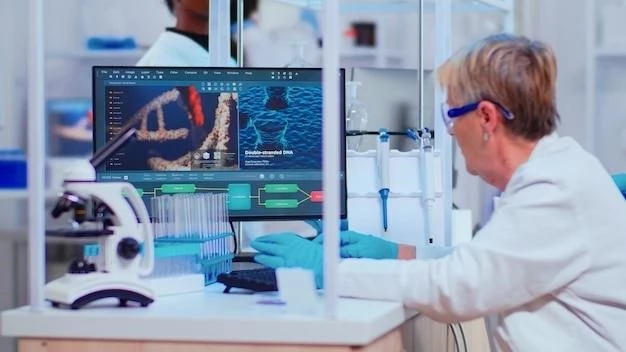Introduction to Reifenstein Syndrome
Partial androgen insensitivity syndrome (PAIS) is when a person who is genetically male is resistant to hormones that produce a male appearance. It is a type of androgen insensitivity syndrome that affects the development of male genitalia and secondary sexual characteristics.
Definition and Overview
Partial androgen insensitivity syndrome (PAIS) is a condition where individuals with a 46‚XY karyotype have difficulty responding to androgens properly due to mutations in the androgen receptor gene. This leads to impaired masculinization of external genitalia and the development of secondary sexual characteristics. As a subtype of androgen insensitivity syndrome‚ PAIS presents a spectrum of defects in androgen action‚ resulting in ambiguous genitalia and hormonal resistance.
Genetics and Inheritance
Reifenstein syndrome‚ also known as partial androgen insensitivity syndrome (PAIS)‚ is an X-linked recessive genetic disorder caused by mutations in the androgen receptor gene. Individuals with Reifenstein syndrome have difficulty responding to androgens properly‚ leading to impaired masculinization of male genitalia and secondary sexual characteristics. This condition has implications for the inheritance pattern and genetic makeup of affected individuals.
Role of Androgen Receptor Gene Mutations
Individuals with Reifenstein syndrome experience impaired responses to androgens due to mutations in the androgen receptor gene. These mutations disrupt the proper functioning of androgens‚ resulting in challenges with the masculinization of male genitalia and the development of secondary sexual characteristics. Understanding the impact of these genetic alterations is crucial in comprehending the underlying mechanisms of Reifenstein syndrome.
Clinical Presentation
Individuals with Reifenstein syndrome commonly exhibit ambiguous genitalia‚ underdevelopment of male secondary sexual characteristics‚ and hormonal resistance leading to challenges in the masculinization process. This presentation reflects the complexity of androgen receptor dysfunction in affected individuals.
Physical Characteristics and Symptoms
Physical characteristics and symptoms of Reifenstein syndrome include ambiguous genitalia‚ underdeveloped male secondary sexual traits‚ hormonal resistance‚ hypospadias‚ gynecomastia‚ small testes‚ absent beard‚ late puberty‚ and elevated follicle-stimulating hormone levels. These manifestations are indicative of impaired androgen receptor function impacting male sexual development.
Differential Diagnosis
When evaluating individuals‚ differential diagnosis considerations for Reifenstein syndrome include other forms of androgen insensitivity such as complete androgen insensitivity syndrome (CAIS) and mild forms like mild androgen insensitivity syndrome (MAIS). Distinguishing features and genetic analyses aid in determining the specific condition affecting the individual.
When comparing Reifenstein syndrome with other androgen insensitivity syndromes such as complete androgen insensitivity syndrome (CAIS) and mild androgen insensitivity syndrome (MAIS)‚ distinct differences in the degree of androgen receptor dysfunction and phenotypic manifestations emerge. Understanding these variations is essential for accurate diagnosis and management of affected individuals.

Diagnostic Approaches
The diagnostic evaluation of Reifenstein syndrome involves comprehensive hormonal testing and genetic analysis to assess the individual’s response to androgens and identify mutations in the androgen receptor gene. These approaches play a crucial role in confirming the presence of the condition and guiding further management strategies.
Comparison with Other Androgen Insensitivity Syndromes
When contrasted with complete androgen insensitivity syndrome (CAIS) and mild androgen insensitivity syndrome (MAIS)‚ Reifenstein syndrome presents a distinct clinical profile characterized by partial androgen receptor dysfunction‚ leading to varying degrees of underdeveloped male external genitalia and secondary sexual characteristics. Understanding these differences aids in accurate diagnosis and appropriate management.
Treatment Strategies
Management of Reifenstein syndrome focuses on addressing the challenges associated with partial androgen insensitivity and may involve a multidisciplinary approach‚ including hormone therapy‚ reconstructive surgery‚ and psychological support to address any gender identity concerns. Individualized treatment plans are essential to optimize the quality of life for individuals with this condition.
Management of Reifenstein Syndrome
The management of Reifenstein syndrome involves a multidisciplinary approach that may include hormone therapy‚ surgical interventions to address physical ambiguities‚ and counseling to support individuals in coping with the condition’s psychological aspects. Tailoring treatment plans to individual needs is crucial for optimizing the overall well-being of those affected by Reifenstein syndrome.

Prognosis and Complications
Individuals with Reifenstein syndrome may face challenges related to infertility‚ ambiguous genitalia‚ and psychological implications. The long-term outlook for individuals with this syndrome depends on the individualized management approach and the extent of complications that may arise.
Long-Term Outlook for Individuals with Reifenstein Syndrome
Individuals diagnosed with Reifenstein syndrome face long-term implications related to fertility issues‚ ambiguous genitalia‚ hormonal complications‚ and potential psychological challenges. The prognosis and quality of life for affected individuals depend on timely interventions‚ personalized treatment approaches‚ and ongoing support to manage the complexities associated with this condition.
Research and Recent Studies
Advancements in the understanding of Reifenstein syndrome involve investigating the underlying genetic mutations in the androgen receptor gene and exploring genotype-phenotype correlations. Recent studies aim to enhance diagnostic accuracy and refine treatment strategies for individuals affected by this complex condition.
Advancements in Understanding Reifenstein Syndrome
Ongoing research into Reifenstein syndrome focuses on elucidating the genetic mutations within the androgen receptor gene that underlie the condition. Recent studies aim to refine genotype-phenotype correlations‚ enhancing diagnostic specificity and advancing personalized treatment options tailored to the individual’s genetic profile.
